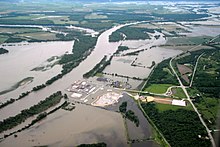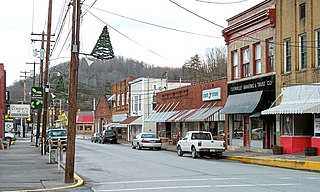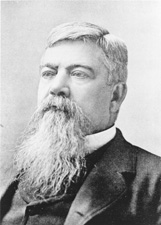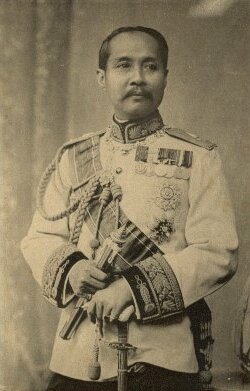
Lists of floods in the United States provide overviews of major floods in the United States. They are organized by time period: before 1901, from 1901 to 2000, and from 2001 to the present.

Lists of floods in the United States provide overviews of major floods in the United States. They are organized by time period: before 1901, from 1901 to 2000, and from 2001 to the present.
Lists of battles contain links to sets of articles on battles. They may be organized alphabetically, by era, by conflict, by participants or location, or by death toll. See Category:Battles for a complete list of articles on battles.

The Hai River, also known as the Peiho, Pei Ho, or Hai Ho, is a Chinese river connecting Beijing to Tianjin and the Bohai Sea.

The Boxer Rebellion, also known as the Boxer Uprising, the Boxer Insurrection, or the Yihetuan Movement, was an anti-foreign, anti-imperialist, and anti-Christian uprising in North China between 1899 and 1901, towards the end of the Qing dynasty, by the Society of Righteous and Harmonious Fists, a group known as the "Boxers" in English due to many of its members having practised Chinese martial arts, which at the time were referred to as "Chinese boxing". It was defeated by the Eight-Nation Alliance of foreign powers.

LeFlore County is a county along the eastern border of the U.S state of Oklahoma. As of the 2020 census, the population was 48,129. Its county seat is Poteau. The county is part of the Fort Smith metropolitan area and the name honors a Choctaw family named LeFlore. The United States District Court for the Eastern District of Oklahoma is the federal district court with jurisdiction in LeFlore County.

Gooding County is a county located in the U.S. state of Idaho. As of the 2020 census, the population was 15,598. Its county seat is Gooding. The county was created by the Idaho Legislature on January 28, 1913, by a partition of Lincoln County. It is named for Frank R. Gooding, the 7th governor and a United States Senator from Idaho.

Cloverport is a home rule-class city in Breckinridge County, Kentucky, United States, on the banks of the Ohio River. The population was 1,152 at the 2010 census.

Glenville is a town in and the county seat of Gilmer County, West Virginia, United States, along the Little Kanawha River. The population was 1,128 at the 2020 census. It is the home of Glenville State University.

The 1900 Galveston hurricane, also known as the Great Galveston hurricane and the Galveston Flood, and known regionally as the Great Storm of 1900 or the 1900 Storm, is the deadliest natural disaster in United States history. The strongest storm of the 1900 Atlantic hurricane season, it left between 6,000 and 12,000 fatalities in the United States; the number most cited in official reports is 8,000. Most of these deaths occurred in and near Galveston, Texas, after the storm surge inundated the coastline and the island city with 8 to 12 ft of water. It remains among the deadliest Atlantic hurricanes on record. In addition to the number killed, the storm destroyed about 7,000 buildings of all uses in Galveston, which included 3,636 demolished homes; every dwelling in the city suffered some degree of damage. The hurricane left approximately 10,000 people in the city homeless, out of a total population of fewer than 38,000. The disaster ended the Golden Era of Galveston, as the hurricane alarmed potential investors, who turned to Houston instead. In response to the storm, three engineers designed and oversaw plans to raise the Gulf of Mexico shoreline of Galveston Island by 17 ft (5.2 m) and erect a 10 mi (16 km) seawall.

The 1900 United States House of Representatives elections were held for the most part on November 6, 1900, with Oregon, Maine, and Vermont holding theirs early in either June or September. They coincided with the re-election of President William McKinley. Elections were held for 357 seats of the United States House of Representatives, representing 45 states, to serve in the 57th United States Congress. Special elections were also held throughout the year.
Lists of Atlantic hurricanes, or tropical cyclones in the Atlantic Ocean, are organized by the properties of the hurricane or by the location most affected.

Donelson Caffery was an American politician from the state of Louisiana, a soldier in the American Civil War, and a sugar plantation owner.
The Philippine Commission was the name of two bodies, both appointed by the president of the United States, to assist with governing the Philippines.

The Taft Commission, also known as the Second Philippine Commission, was established by United States President William McKinley on March 16, 1900, following the recommendations of the First Philippine Commission, using presidential war powers while the U.S. was engaged in the Philippine–American War.

Henry De La Warr Flood was a representative from the Commonwealth of Virginia to the United States House of Representatives, brother of U.S. Representative Joel West Flood and uncle of U.S. Senator Harry Flood Byrd.

The following events occurred in April 1900:

The 1900–01 United States Senate elections were held on various dates in various states, coinciding with President William McKinley's re-election as well as the 1900 House of Representatives elections. As these U.S. Senate elections were prior to the ratification of the Seventeenth Amendment in 1913, senators were chosen by state legislatures. Senators were elected over a wide range of time throughout 1900 and 1901, and a seat may have been filled months late or remained vacant due to legislative deadlock. In these elections, terms were up for the senators in Class 2.
These lists of unsolved murders include notable cases where victims were murdered in unknown circumstances.